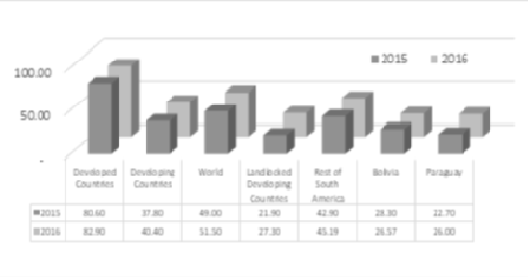


Indian Journal of Science and Technology
DOI: 10.17485/IJST/v13i34.1145
Year: 2020, Volume: 13, Issue: 34, Pages: 3521-3537
Original Article
A Davalos Yoshida1*, Richard-Jesús Gil-Herrera2
1Doctorate Department, Faculty of Social Sciences, American University of Europe(www.unade.mx), ABS Consulting Group (www.abs-cgroup.com), La Paz, Bolivia
2Doctorate Department, Faculty of Social Sciences, American University of Europe(www.unade.mx), Cancún, México
*Corresponding Author
Email: [email protected]
Received Date:31 July 2020, Accepted Date:05 September 2020, Published Date:18 September 2020
Objectives:To validate if the condition of Bolivia as a landlocked country is the main reason for the low Internet penetration, or whether there are others relevant factors. Specific objectives: To review the telecommunication infrastructure as an essential facility, as well as to verify if deficient regulation or absence of incentives are other reasons for the low Internet penetration.Methods: Some literature about the role of telecommunications in the economic development, the theory of firm and the non-cooperative behavior, have been analyzed. As part of this research of the theoretical framework and empirical validation, some works about the use of technology, as well as others about performance of Internet markets in landlocked countries around the world have been reviewed. Some South American country cases have been analyzed. Additionally, the regulatory, legal, and economic aspects of Bolivian telecommunications were studied in comparison with the other landlocked South American country. For the empirical validation, a costs model of the firm has been designed. Findings: In comparison with other countries in the region, Internet access in Bolivia is among the most expensive ones.The evidence found in this study points out that this is due to absence of appropriate regulation and because the Internet market is highly concentrated, but it is not due to its condition of being a landlocked country. Novelty:Contrary to what would be expected using conventional wisdom, the lack of Internet development in Bolivia is not a consequence of its landlocked condition. Conversely, according to the results of the cost model developed for this study, low Internet penetration seems to follow a process of high market concentration as result of insufficient regulation. Hence, it seems necessary that the market of Internet access in Bolivia be economically regulated and to accomplish this, the normative needs to be revised and amended.
Keywords: Internet; telecommunications; regulation; competency; landlocked countries; development
© 2020 Davalos Yoshida & Gil-Herrera.This is an open-access article distributed under the terms of the Creative Commons Attribution License, which permits unrestricted use, distribution, and reproduction in any medium, provided the original author and source are credited. Published By Indian Society for Education and Environment (iSee).
Subscribe now for latest articles and news.